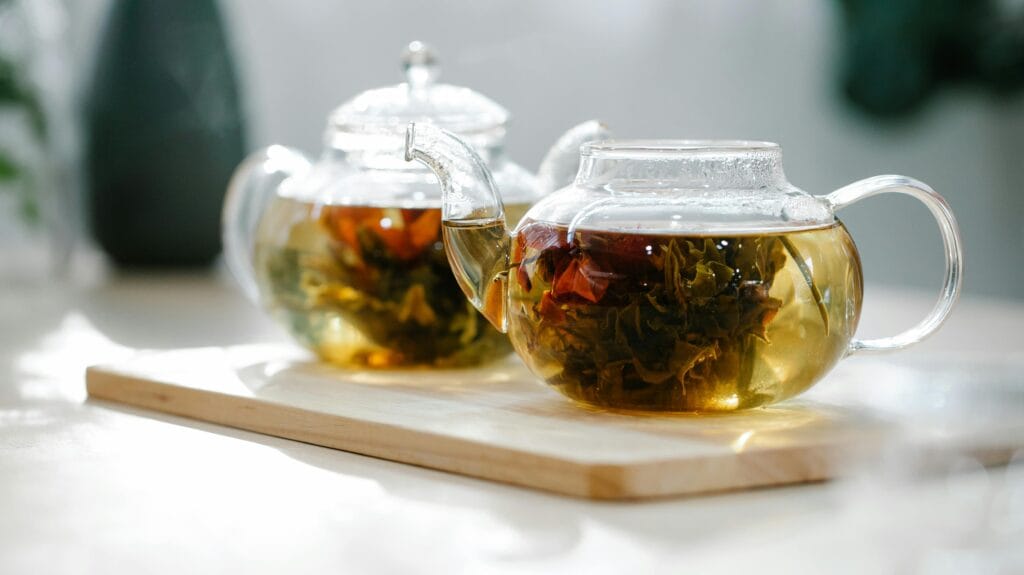Blog
What Are Herbal Infusions: Health Benefits, 5 Key Types, and How They Differ from Traditional Tea
Table of Contents
If you think herbal infusions are just about chamomile tea before bedtime, you’re in for an aromatic surprise. The world of herbal infusions extends far beyond this popular sleep aid, offering a rich tapestry of flavors, aromas, and health benefits that have been cherished across cultures for centuries. From the vibrant purple of butterfly pea flower to the energizing effects of cordyceps, herbal infusions are experiencing a modern renaissance as people seek natural alternatives to traditional beverages.
As our understanding of wellness evolves, more people are discovering that the ancient practice of steeping herbs in hot water isn’t just about creating a pleasant drink – it’s about harnessing nature’s pharmacy in its most accessible form. Whether you’re looking to support your immune system, enhance your sleep quality, or simply explore new flavors without caffeine, the world of herbal infusions offers something for everyone.
What Is an Herbal Infusion?
An herbal infusion is a drink made by steeping plant materials – from leaves and flowers to roots and berries – in hot water to extract their beneficial compounds. Unlike traditional tea, which comes from the Camellia sinensis plant, herbal infusions can be crafted from virtually any edible botanical ingredient, opening up a world of possibilities for both flavor and wellness benefits.
Herbal Infusion vs Traditional Tea: Key Differences
Understanding the distinction between herbal infusions and traditional tea is crucial for any wellness enthusiast. True tea comes exclusively from the Camellia sinensis plant, producing varieties like green, black, white, oolong, and pu-erh tea. These teas naturally contain caffeine and specific compounds like catechins and tannins.
In contrast, herbal infusions are caffeine-free beverages made from various plant materials. They offer a broader range of flavors and are often consumed for their specific therapeutic properties. This caffeine-free nature makes them perfect for evening consumption or for those seeking to reduce their caffeine intake.

5 Types of Herbal Infusions
Leaf-based infusions
- Peppermint: Known for its refreshing taste and digestive benefits
- Lemongrass: Offers a citrusy note and anti-inflammatory properties
- Lemon Balm: Provides calming effects
- Rooibos (red bush): Rich in antioxidants
- Nettle: Packed with minerals and natural antihistamines
- Holy Basil (Tulsi): Revered in Ayurvedic medicine for its adaptogenic properties
Flower-based Infusions
Floral infusions bring both beauty and therapeutic benefits to your cup:
- Chamomile: Famous for its calming properties
- Hibiscus: Tart and rich in vitamin C
- Lavender: Known for its relaxing aroma
- Rose: Offers a delicate flavor and emotional benefits
- Jasmine: Provides a sweet, exotic aroma
- Butterfly Pea Flower: Known for its stunning blue color and antioxidant properties
Root-based Infusions
These grounding infusions often provide deeper, more complex flavors:
- Ginger: Excellent for digestion and inflammation
- Licorice Root: Naturally sweet and supporting adrenal health
- Dandelion Root: Supports liver function
- Turmeric: Powerful anti-inflammatory properties
Fruit-based Infusions
Sweet and tart, fruit infusions offer a natural way to enjoy fruit flavors:
- Apple: Provides natural sweetness
- Citrus (orange, lemon): Rich in vitamin C
- Berries (goji, elderberry): Packed with antioxidants
Seed-based Infusions
Seeds bring unique flavors and specific health benefits:
- Fennel: Aids digestion
- Anise: Supports respiratory health
- Coriander: Helps with digestive comfort
Health Benefits of Herbal Infusions
Naturally Caffeine-Free Alternative
Most herbal infusions are naturally caffeine-free since they don’t contain Camellia sinensis, making them an excellent choice for those sensitive to caffeine or seeking a calming beverage. This characteristic makes them perfect for evening consumption when you want to unwind without disrupting your sleep patterns.
Hydration with Added Benefits
Unlike sugary drinks or caffeinated beverages, which can have diuretic effects, herbal infusions offer a delightful way to stay hydrated while delivering additional health benefits. They’re naturally sugar-free and don’t have the bitter or pungent taste often associated with coffee or traditional tea, making them an excellent choice for maintaining daily fluid intake.
Relaxation and Sleep Support
Many herbal infusions, particularly those containing chamomile and lavender, are renowned for their calming and sleep-promoting properties. These gentle yet effective herbs have been used traditionally to help ease into restful sleep and reduce nighttime anxiety, making them popular choices for evening routines.
Antioxidant Protection
Herbal infusions are powerhouses of antioxidants, with varieties like goji berries, hibiscus, and rooibos leading the pack. These antioxidants play a crucial role in combating oxidative stress in the body, helping to protect cells from damage and supporting overall health and longevity.
Digestive Wellness
For those dealing with digestive discomfort, certain herbal infusions can provide natural relief. Mint and ginger are particularly effective at easing digestive issues like indigestion, bloating, and nausea. These herbs have been used traditionally across cultures as gentle yet effective digestive aids. Check out Blue Detox, which combines ginger, spearmint, and goji as key ingredients.
Immune System Support
Boosting your immune system can be as simple as enjoying a cup of the right herbal infusion. Herbs like elderberry, echinacea, and lemon balm are well-known for their immune-supporting properties, helping your body maintain its natural defenses against seasonal challenges.
Anti-inflammatory Properties
Many herbal infusions offer natural anti-inflammatory benefits. Herbs like turmeric, ginger, and licorice root contain compounds that help reduce inflammation in the body, potentially offering relief from various inflammatory conditions and supporting overall wellness.
Getting Started with Herbal Infusions
To begin your herbal infusion journey:
- Start by understanding your unique wellness goals and flavor preferences
- Experiment with different teas, with or without sugar, honey, or lemon, to find the right health and flavor balance
- Use fresh, clean water heated to the appropriate temperature
- Follow recommended steeping times (typically 5-15 minutes), then mix and stir to fully release the flavor
Conclusion: Embracing the Healing Power of Herbal Infusions
As we’ve explored, herbal infusions offer a natural path to wellness. Among the many beneficial ingredients you can include in your herbal infusions, goji berries stand out for their exceptional nutritional profile. These bright red berries add a subtle sweetness while providing powerful antioxidants, essential amino acids, and vitamins that support overall wellness.
Whether you’re new to herbal infusions or looking to expand your wellness routine, consider incorporating goji berries into your daily ritual. For a convenient way to experience the benefits of goji berries in your herbal infusions, Gobi Goji Tea offers carefully crafted blends that celebrate this ancient superfood.
Remember, the journey to wellness is personal, and herbal infusions provide a delicious, natural way to support your health goals. Start exploring these diverse botanical treasures today, and discover the perfect blend for your lifestyle.

